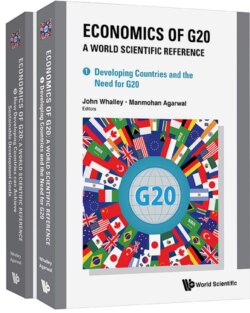Читать книгу Economics of G20 - Группа авторов - Страница 18
На сайте Литреса книга снята с продажи.
Attempts at International Cooperation to Stabilise the Economy Genoa Conference
ОглавлениеThe Genoa Conference (GC) was held in 1922 to find a cooperative solution to the ills of the world economy, particularly the European economies. However, the major powers had very different expectations. Also, political and economic objectives were intertwined. The British and the French had called for the conference. The French were mainly interested in ensuring their security from Germany. They sought to cripple Germany’s power and reparations were one way to do so; thus, their main concern was that reparations be paid to them and that there would be no reduction in the amount of reparations.
The British sought a revival of the world economy by agreement on monetary measures and the reintegration of Germany, the Soviet Union and other East European economies into the world economy as this would boost British exports and so the economy. The Soviets also hoped for their reintegration into the world economy. The US, expecting that they would be pressurised to write-down the war debts owing to them, did not officially attend.15 Furthermore, the US economy seemed to have overcome its earlier recession and was now growing rapidly so that European revival seemed less necessary for its own prosperity. Furthermore, they had not recognised the Soviet Union and did not want to officially attend a conference with them.
The UK was most interested in the revival of Germany and Russia. Negotiations foundered when France and Belgium, pre-revolutionary Russia’s main creditors, insisted on the repayment of pre-war loans and restitution of confiscated foreign-owned property in Soviet Russia. The US was also unwilling to deal with Russia unless it recognised its responsibility for the tsarist debts and met other conditions which essentially meant a repudiation of communism. On the contrary, Russia wanted to be reintegrated economically without accepting liability for tsarist debts and without any political and economic strings.
Genoa seemed to provide a map for the reconstruction of the international monetary system. The draft resolutions, piloted by the British Chairman Hawtrey, sought to both increase the supply of gold available to the central banks and reduce the demand. Withdrawal of gold coinage meant that the entire amount of available gold was at the disposal of the central banks. The demand for gold was sought to be reduced, through adoption of the GES.16 Countries held their reserves in the form of other currencies, usually the pound sterling. The proposed GES mitigated the deflationary pressure arising from the demand for gold as countries returned to the GS.
Also, devaluation of currencies that had depreciated significantly was recommended, in order to speed restoration of the GS. It was also recommended that independent central banks be set up in the newly independent countries and that the central banks should cooperate continuously in order to manage the system and be free from political pressure. Cooperation would regulate credit to maintain the currencies at par and to prevent undue fluctuations in the purchasing power of gold.
While all parties agreed on the need to return to gold, the resolutions fudged on just what the GS was and would be, and when and how countries off gold would get there. Furthermore, the French and the Belgians did not accept the need to devalue.17
Consequently, the progress at Genoa did not lead to a durable reconstruction of the system. The French role at the conference and policy thereafter illustrate how little real consensus existed among the conference participants and how opposition to the Genoa principles, present from the start, developed in the later 1920s. They, along with a number of other countries, were not in favour of devaluation and wanted a return to the pre-war parities. Furthermore, the French were against the adoption of the GES as it would give undue importance to the pound.18
The GC, however, had a long-run effect. The Bank of International Settlements (BIS) set up to manage the Young Plan became a forum for meetings of central bankers, which it continues to be to this day. These meetings helped develop common ideas on monetary policy and the role of central banks. Two of the ideas that have become very prominent are that central banks should be independent and that the only objective of central banks should be to control the rate of inflation.19
